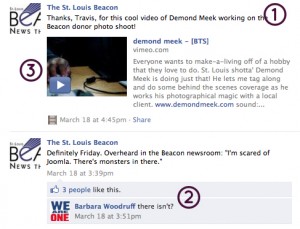Part 1
With more than 500 million users, Facebook is one of the most popular sites in the world![]() and can be a powerful tool for building community and deepening engagement with existing listeners and readers. News organizations are using the site for everything from sourcing stories, to running contests and giveaways, to presenting special multimedia features.
and can be a powerful tool for building community and deepening engagement with existing listeners and readers. News organizations are using the site for everything from sourcing stories, to running contests and giveaways, to presenting special multimedia features.
The network’s tiered sharing system and multimedia components allow organizations to distribute content in multiple ways and can encourage in-depth discussions more effectively than many other social sites.
News organizations are using the site for everything from sourcing stories, to running contests and giveaways, to presenting special multimedia features.
Despite its size, Facebook is still a password-protected network and this tends to give users a thin sense of privacy, resulting in candid conversations and discussions that can provide journalists and news organizations a chance to deepen relationships with readers.
Facebook, however, is not perfect.
Facebook’s navigation and always-changing privacy settings are concerns. The site’s navigation is not the most intuitive, and there are frequent updates and style changes that can disrupt the functionality of some third-party Facebook applications.
Questions have also been raised about the company’s gathering and storing of user information. The site stores users’ personal information and has released statements about using these materials in customizing display ads and sharing information with other companies. Despite these issues, the platform’s popularity and flexibility make it a valuable tool for journalists and media organizations.
Let’s walk you through some basic terminology, provide suggestions for individual reporters and news teams, and offer tips on how to promote a page and recommend third-party software.
Because a Facebook page will be one of the building blocks of your social media strategy, spending some time and attention on learning how to operate a Facebook page is just as important as deciding how you will use it to discuss, share and market the content you—and your audience—create.
Facebook Best Practices
Should you have a profile page, a fan page or a group page?
Facebook offers three different types of pages that can be customized and used by journalists: Profile pages, fan pages and group pages.
Very simply, profile pages are designed for individuals, fan pages are for businesses, community organizations, celebrities and established brands, and group pages are for groups of individuals with shared interest.
Personal Pages
Personal pages are the basic page that every Facebook user creates. While they can be designed to promote a business or organization, it is not recommended. Instead, fan pages offer similar features, such as comment walls and photos.
The most popular way of building a community around your personal page is by sending people you know a “friend request” through Facebook. Providing that the friend requests are accepted and made with genuine interest, it is possible for personal users to grow their networks relatively quickly.
Fan Pages
Facebook fan pages are generally used to establish an official Facebook presence and connect with target audiences. However, unlike personal Facebook profiles, Twitter, Tumblr and other sites, a Facebook fan page itself has no mechanism for “friending” or following new users.
Though users can recommend a fan page to their friends, the “Fan” and “Like” buttons must be voluntarily clicked by fans. (Group pages operate differently, allowing you to add your friends to a group that you establish.) Because of this, it’s important to promote an organization’s Facebook fan page as much as possible through other channels.
It can be challenging for a fan page to acquire new followers, but a fan page offers a greater range of tools to interact with your community, such as polls, event postings and a discussion topics board. You will need such tools for long- term success.
Fan pages also offer Google SEO indexing, news feed publishing, language or area-targeted news feed posting, targeted updates, application support, engagement metrics, promotional widgets and unique URLs once you reach more than 100 fans.
These pages also allow organizations to customize the functionality of the page through third-party applications. Most of these applications appear as tabbed pages that can range from custom content and multimedia to contests, polls submission forms.
Personal profiles are usually maintained by one individual, but since fan pages most often represent an organization, each page can be updated by several administrators.
This allows you to split responsibilities for managing the page, but also means that there will need to be a discussion about style of posts and general codes of conduct among the group. A great example of a style sheet for managing diverse voices under one brand is the Red Cross’s social media handbook.
Group Pages
Facebook group pages are very similar to fan pages in that they offer a communal space for information to be posted and include many of the same tools. Groups, though, are more often used to collaborate on a specific idea or cause rather than broadcast information from an entity. For this reason, you can make a group open to the public, or keep it private for individuals or networks.
Group pages offer mass messaging, Google SEO indexing, news feed publishing, membership restriction and event inbox messaging.
Facebook Insights Keeping track of your organization’s activity on Facebook can be important to demonstrate to funders or sponsors. Facebook Insights is a useful built- in analytics and measuring program that lets you track page visits, page impressions and the popularity of specific types of content on both fan pages and group pages. Page owners will receive weekly e-mails that detail user activity on their site as well.
What are the elements of an effective Facebook Fan page?
- Personalized, conversational posts
- Comments from and interaction with the community
- Multimedia content
- A completed information page
- Custom welcome page
